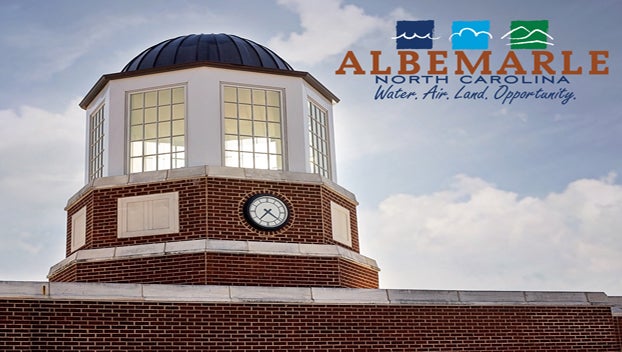Albemarle council enters into agreement with LKC to improve wastewater treatment plant
Published 10:40 am Wednesday, July 13, 2022
|
Getting your Trinity Audio player ready...
|
The Albemarle City Council on Monday night approved entering into an agreement with LKC Engineering to work with the city to formulate plans for improving the Long Creek Wastewater Treatment Plant, notably converting the facility to a fine bubble aeration system, along with facilitating the bidding process and helping select the contractor that will implement necessary upgrades.
Albemarle has been under a special consent order with the state since November 2020, which has mandated the city make improvements to its treatment plant, which has had a number of minor non-compliant events dating back to 2018, including sustained high-flow storm-related events and low biological strength.
One of the key improvements proposed by LKC would be to convert two aeration basins from floating aerators to fine bubble diffused aeration. The aeration system produces small air bubbles which rise slowly from the floor of a wastewater treatment plant and provide substantial and efficient mass transfer of oxygen to the water before it’s discharged back into the creeks.
Currently, the plant has four aeration basins but only two would be needed to accomplish the level of treatment needed, Adam Kiker of LKC Engineering told council. The remaining two would be transitioned to flow equalization and would remain mostly empty. This would provide the city with about 800,000 gallons in flow equalization storage during peak events like severe storms, according to Kiker’s presentation.
By converting to a fine bubble aeration system, the city would be at a lower risk of non-compliance, Kiker said.
“What we’re targeting here primarily is: let’s make sure that we significantly reduce your risk of non-compliance,” Kiker told council. “We want to fix those (the challenges identified by the state) to the fullest extent that we can.”
The new aeration process would also make the plant more efficient: it would require only about 600 horsepower, much lower than the 1,440 horsepower currently needed.
Aside from converting the treatment plant to a fine bubble diffusion system, another rehabilitation measure includes a complete electrical systems upgrade, including a new standby generator to power all critical treatment processes. Another proposed improvement involves constructing a new building to house the new blowers and electrical systems.
The total cost for the upgrades is about $19.7 million, which will be funded through a Clean Water State Revolving Fund loan, with $500,000 of the loan amount being forgiven. The remaining loan will be offered at a 20-year term with a 0.1 percent interest rate. The engineering fees are included as part of the total project cost.
LKC plans to begin the design drawings for the proposed upgrades this month. Final design plans should be completed by October 2023, according to the timeline presented to council. Construction would begin sometime in August 2024 and finish in the spring of 2026.
Kiker told council that after all the upgrades have been made, if the city decides to expand its services, “the pathway to expansion will be much, much easier, simpler and more efficient and much less expensive.”
After some discussion and questions for Kiker, council approved the agreement, provided that city attorney Britt Burch reviews and approves of the written agreement.
The State Water Infrastructure Authority (SWIA) and the Local Government Commission (LGC) have developed criteria to assess local government units and identify ones that can be designated as “distressed.” The utility’s level of “distress” is measured by total population, population growth trends, median household income and rate affordability. It is also measured by factors that can place stress on the utility such as age of infrastructure and its long-term sustainability.
Increased development and future added maintenance were enough for both the SWIA and LGC to determine Albemarle met the criteria for the distressed designation. The distressed designation does not mean Albemarle’s utility has been mismanaged, is operationally deficient or financially unstable. City council approved a resolution to designate the city as a distressed utility. This could allow the city to receive financial benefits from the state ahead of other municipalities, but does not necessarily guarantee funding.
“It does put you in the position to apply for a pot of money that other utilities cannot,” Kiker said.





